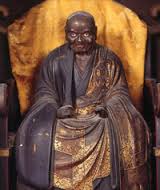For whom the bell tolls?
I saw a posting on Facebook where someone suggested that what most people regret on their deathbeds is what they didn’t do.
Certainly Buddhism, Zen, (and for that matter, Biocentrism) is about the big questions of your life and death, and how you face your life and death, and indeed understanding that death can come at any time.
It’s easy to think the other road, the one not taken, was the one to abiding happiness and success and joy. I suspect it is at least possible that some people who do feel that way on their death bed, that they regretted what they didn’t do, if they were honest with themselves, felt that way before they new they were dying.
That is an important pursuit in Zen practice, being aware of your life, knowing yourself and your mind. Not waiting till it all falls apart.
Now, one point, one conclusion, that the person who wrote about that death bed reaction made was: follow your dreams. Write that book, sing that song.
But consider: is this just wishing for a better past? If you didn’t go after something you thought you wanted, or thought would have been oh so cool, maybe you had a good reason, something more important you had to attend to. Maybe you knew or even just had an intuition that another course of action was needed, even if you aren’t so sure now. Memory is selective. It is easy to think it could have been better, that the path not taken was THE key to all sweetness and light and a great life!
Now, if you didn’t pursue some activity out of fear, or delusional feelings of guilt, or concerned about not being worthy or not being good enough, and that is how you still respond, that’s the issue, isn’t it?
Living life fully isn’t a matter of pursuing some specific great idea or activity, of doing all the awesome, rewarding and artistic and adventurous things you can get into or out of your “bucket” of cool stuff. I personally have no interest in “bucket lists” of “must do stuff” (there’s always more and more and MORE).
You don’t need to fill your life with things and activities, artistic, creative, cool, or otherwise.
Life is full if you just look at where you are, what’s in front of you; as they say in Zen, cover the ground you stand on. You don’t need more doing. Most of us actually need LESS doing. Less going after that wonderful experience you imagine will make it better, that creative glorious life over the rainbow. Less re-writing the past. Less seeking praise and fearing blame. Less drama.
As it says in the heart sutra: no idea of gain, so no fear. No hindrance in the mind.
And as the very, very accomplished (you and I should be so accomplished!) Laplace reportedly said on his deathbed when someone commented on just how wonderful and accomplished he had been in his life (he was perhaps THE foremost mathematician and scientist and philosopher of his age, hobnobbing with the “in” crowd, hanging with artists, authors and even Napoleon Bonaparte, the most powerful man in the world at the time):
“Ah, well, we do chase phantoms, don’t we?”
So, sure, I suggest that you don’t waste your time on dumb stuff, and certainly don’t hold back out of fear. Do what seems right, compassionate, just and good, but don’t chase phantoms. Don’t make some artistic endeavor, some idea or concept of success (however awesome), of creativity, some experience on a bucket list, a fantasy lover never loved, or a dream you think you should have or would have pursued “if only”, into something to moan about, something to regret, into just more busywork and useless striving, something more to feel bad about. Don’t set yourself up for misery and failure.
If you do, it’s just another phantom. A bad dream.
Sing the song, paint that painting, take that photo, take that trip, get a better job, write the novel, if you like and it works for you. If not, that’s ok too.
Try this: Don’t waste your time. Pay attention. Do what is right when you know it’s right. No self-deception. don’t wish for a better past, it does no good and causes great pain (you can tell I really like that; thanks Lily Tomlin!).
Compassion is a good thing, including compassion for yourself.
Creativity is the Way, is life. You don’t have to strive for it. Don’t try to fake it. You ARE creativity in form and function! You can’t be otherwise.
Creativity, living a full life, is what happens when your ego, your delusions (including your idea/conditioning/concept of creativity and a full life), don’t get in the way. Compassion and ethics are like that, too.
That’s more than enough! What more is there? What more can there be?
Life is full just in this breath, this heartbeat. Live fully in the moment.
Simple, not easy.
Living life fully is not about some specific experience or activity or doing cool stuff. Not what society or your fantasy defines as artistic or creative or successful or glorious. The Universe, Mind, your mind, is cool enough.
I have found meditation, practice, really helps with this.
Zen, Buddhism, is about life and death. The book “Beyond Biocentrism” is a good place to start about Mind and Consciousness and Life and Death if you aren’t into Buddhism or Zen.
But I do agree with the main idea of that person who wrote about deathbed regrets: Don’t wait until you are on your deathbed. That seems kind of sad.




